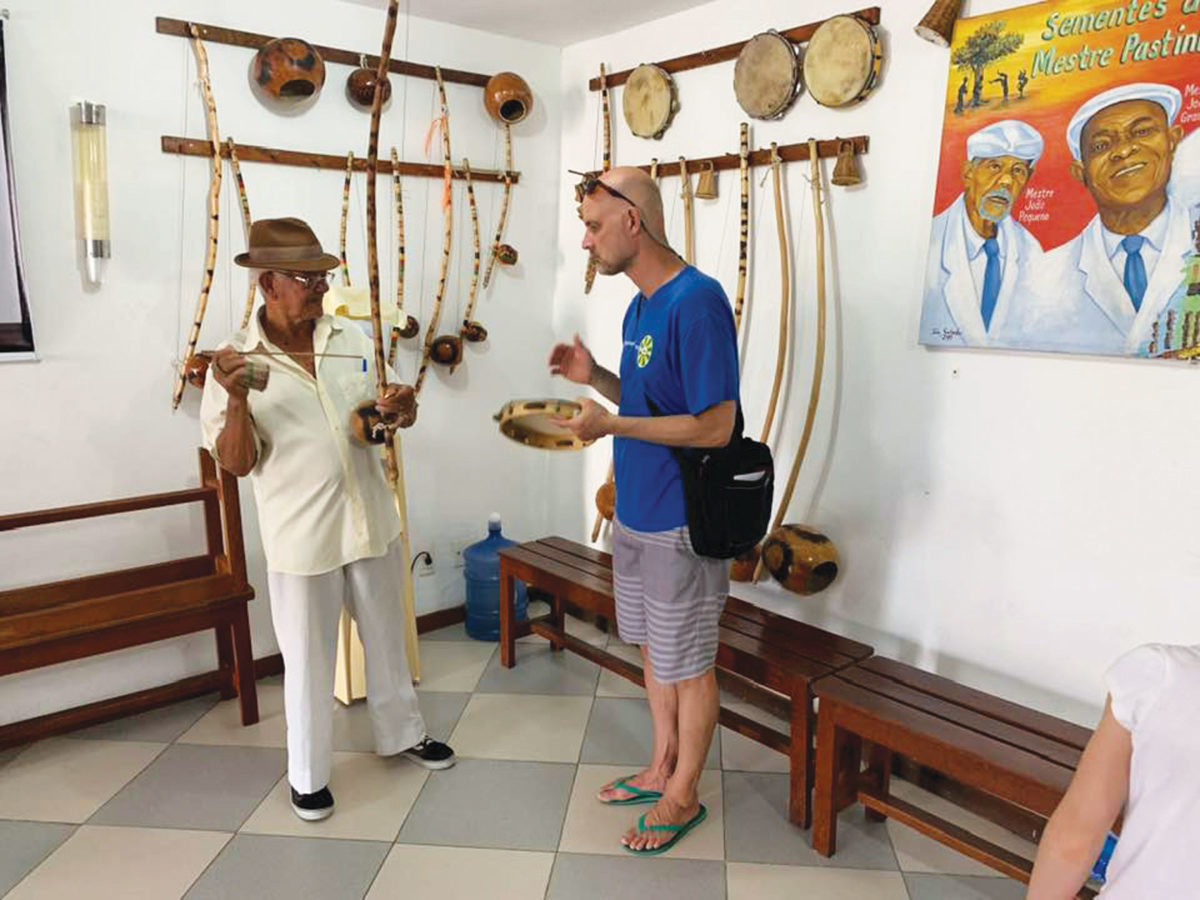Can You Feel the Forró Beat?
Christopher Fashun, Dma | Assistant Professor of Music
The rhythms of Afro-Brazilian music still echo the ancient drumbeats of Africa — carried across oceans on slave ships, adapted across the centuries, and today encompassing both a distinctive cultural identity and a communal national bond.
Christopher Fashun (at right in photo) spent four months of 2019 in Brazil as a Fulbright Scholar, researching the dissemination of Afro-Brazilian music and culture in the coastal city of Salvador da Bahia and throughout Brazil.
“Salvador is widely acknowledged as the Afro-Brazilian capital of Brazil,” Fashun says. In Salvador, one of the largest cities in Brazil, around 80 percent of the population identifies as either black or of multi-ethnic ancestry.
From May through August 2019, Fashun, who directs the Hope College Brazilian Music Ensemble, immersed himself in Salvador’s Afro-Brazilian music and culture. He performed at an international percussion festival; worked with Jorge Sacramento, professor of percussion at the Universidade Federal da Bahia (Federal University of Bahia); and studied with Mestre Mario Pam, the music director of Ilê Aiyé, the oldest Afro bloco, or Afro-Brazilian carnaval block (as Brazilians call community centers).
“My Fulbright research resulted in a synthesis from opposite perspectives — academic through the lens of the university and then, with my colleague Mario, through the eyes of the Afro-Brazilian experience,” Fashun says. “I started to ask, How do the Brazilians share this musical culture? Because they share it not just within a city or a state, but throughout the nation. There are certain genres of music that are shared nationwide.”
“These Afro-Brazilian rhythms, which originate from the Afro-Brazilian religion candomblé, have made their way into popular music. Even if you’re not from Salvador or the northeast, where these rhythms are more prevalent,people everywhere know it.”
One thing that is readily apparent — and markedly different from the United States — is that public school students receive no formal musical education. In the United States, most elementary school students spend at least a little time each week with a recorder or a triangle, but in Brazil, musical education (which is to say, the passing on of a musical tradition from one generation to the next) takes place entirely outside of the school setting.
So how do they do it? How do music and dance genres as culturally significant as samba and choro get passed along through particular cultures (like Salvador’s Afro-Brazilian culture) and into the national consciousness?
Fashun attributes it to two main elements: festivals and social programs.
Carnaval, of course, is the biggest Brazilian festival, the one everyone thinks of — but music is also a big part of smaller festivals throughout the year. Fashun was in Salvador for Festa Junina, a month of celebration rooted in church festivals of the Portuguese colonial era, celebrations of Santo Antônio (St. Anthony), São Pedro (St. Peter) and the nativity of São João (John the Baptist). During June, people gather together in a series of small parties that can have the feel of a family reunion; in rural areas it’s common for people to return to the places they grew up.
“It’s this celebration of three Catholic saints, but it’s also rolled into this other form of music called forró, which is really popular. You hear it everywhere. You hear the music in shopping malls, in restaurants, on the radio,” he says. “These little kids hear the songs for the whole month of June and probably even throughout the year, because it’s just such a popular form of music.”
In addition to festivals, “music is perpetuated through what they call ‘social projects,’” Fashun says, which are government-approved cultural programs. The entire Fashun family participated in them during their stay in Salvador. “I studied drumming, my wife and I studied Afro-Brazilian dance with a teacher, and then my daughter and I did capoeira, which is a martial art developed by slaves.”
Fashun was invited to observe a social project called NEOJIBA (an acronym derived from its full name, Núcleos Estaduais de Orquestras Juvenis e Infantis da Bahia — in English, Nuclei of Youth and Children’s Orchestras of the State of Bahia). This method of teaching music to children is based on the Venezuelan El Sistema model for teaching classical music, and operates through music centers funded by the Brazilian government and private organizations. In addition to classical music, though, NEOJIBA teaches children how to play traditional and popular Brazilian music — and, especially in Salvador, Afro-Brazilian music.
Experiencing firsthand these cultural festivals and government-approved cultural education programs reinforced for Fashun the importance of expanding music education beyond the classroom and into communities, which is something he already was putting into action: Hope’s Brazilian Drumming Ensemble performs for educational assemblies and other events throughout Michigan. And he points out that the U.S. has its own version of Brazil’s government-sponsored “social project”: independent American nonprofit organizations and cultural centers that work to pass on traditional forms of music intergenerationally.
“In Salvador,” Fashun says, “they’re hitting it from all different angles — culturally and through their familial connections — to celebrate these things that continue to unite them as a people.”


